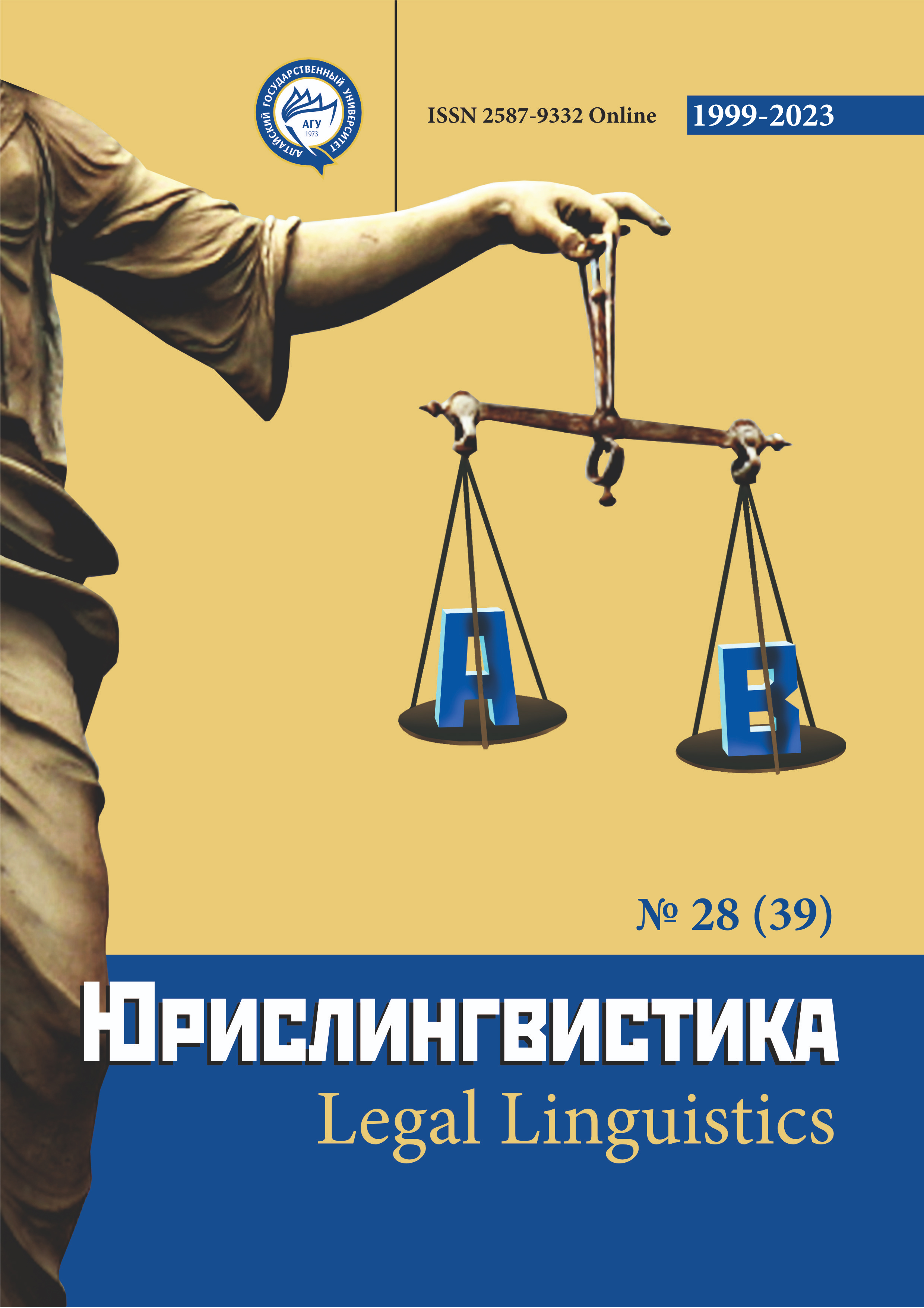Terminology of Information (Digital) Law: Semantics, Structure, Legislative Definitions
УДК 81.42:340.13, ББК 81+67.022.14
Abstract
Attention is drawn to the conceptual apparatus of laws that regulate the processes of digitalization and the information sphere. The relevance is due to the following factors: insufficient scientific coverage of education issues and the definition of terms in the information (digital) sphere; demand for the results of theoretical understanding of these issues in expert (law enforcement, judicial) practice; problems of using borrowed vocabulary in normative texts. The features of semantics and structure of terms, including word-combination-terms, as well as word complex-terms are considered. The main methods of term formation and changes in the motivating stem are indicated. The grounds, methods and examples of alternative replacement of terms are analyzed. When considering the specifics of legislative definitions, emphasis is placed on the following points: firstly, the functions of the legislative (official) definition of the term; secondly, the conditions for formulating and adequately interpreting the definition; thirdly, frequently used means of formulating definitions, their structural features. In addition, attention is paid to such features as: variability of definitions of one term, duplication of the definition of a term in different legislative texts, coincidence of legislative definitions of different terms. To implement the objectives of the study, the methodology of legal linguistics and expertology is used. Research material: federal laws, as well as model codes and laws developed by CIS Interparliamentary Assembly.
Downloads
Metrics
References
Авакьян С. А. Информационное пространство знаний, цифровой мир и конституционное право / Конституционное и муниципальное право. - 2019. - № 7. - С. 23-28.
Бегишев И., Берсей Д. Цифровой мир: терминологический словарь-справочник в определениях официальных документов / Юрислингвистика. - 2022. - № 25 (36). - С. 55-56.
Виноградов В. В. Русский язык. (Грамматическое учение о слове). М., Л. 1947.
Володина М. Н. Термин как языковое выражение специального понятия / Stephanos. - 2019. - № 4 (36). - С. 160-166.
Голев Н. Д. Юрислингвистика. Вводный очерк теории. Кемерово, 2021.
Голев Н. Д., Иркова А. В. Эволютивная юридизация лексики: теоретические и методические аспекты / Вестник Волгоградского государственного университета. Серия 2: Языкознание. - 2022. - Том 21. - № 2. - С. 5-18.
Горбаневский М. В., Трофимова Г. Н. ГЛЭДИС в цифровом пространстве. М., 2021.
Гринев С. В. Введение в терминоведение. М., 1993.
Даниленко В. П. Лексико-семантические и грамматические особенности слов-терминов / Исследования по русской терминологии. М., 1971. С. 7-78.
Лотте Д. С. Основы построения научно-технической терминологии: Вопросы теории и методики. М., 1961.
Макович Т. В. Дискредитирующие коммуникации в контексте лингвоэкологии. В сб.: Язык. Культура. Общество. Санкт-Петербург, 2021. С. 95-98.
Плотникова А. М. Документный текст как объект судебной лингвистической и автороведческой экспертизы / Вестник Волгоградского государственного университета. Серия 2. Языкознание. - 2016. - № 1 (30). - С. 37-43.
Россинская Е. Р., Галяшина Е. И. Настольная книга судьи: судебная экспертиза. М., 2011.
Терещенко Л. К. Трансформация понятийного аппарата информационного права в условиях цифровизации / Журнал российского права. - 2022. - № 12. - С. 98-110.
Трубникова Ю. В., Доронина С. В. Проблемы формирования навыков владения деловой речью в аспекте развития профессиональной языковой личности / Лингвориторическая парадигма. - 2020. - № 25-1. - С. 110-112.
Хабриева Т. Я., Черногор Н. Н. Право в условиях цифровой реальности / Журнал российского права. - 2018. - № 1. - С. 85-102.
Хижняк С. П. Терминологическое значение и его отражение в дефинициях / Вестник Саратовской юридической академии. - 2018. - № 2 (121). - С. 233-238.
Чернышова Т. В. Аналитико-экспертная деятельность филолога и проблема выбора метода в современной лингвоэкспертной практике / Acta Linguistica Petropolitana. Труды института лингвистических исследований. - 2016. - Т. 12. - № 3. - С. 16-28.
Copyright (c) 2023 Марина Батюшкина

This work is licensed under a Creative Commons Attribution 4.0 International License.
The authors, which are published in this journal, agree to the following conditions:
1. Authors retain the copyright to the work and transfer to the journal the right of the first publication along with the work, at the same time licensing it under the terms of the Creative Commons Attribution License, which allows others to distribute this work with the obligatory indication of the authorship of this work and a link to the original publication in this journal .
2. The authors retain the right to enter into separate, additional contractual agreements for the non-exclusive distribution of the version of the work published by this journal (for example, to place it in the university depository or to publish it in a book), with reference to the original publication in this journal.
3. Authors are allowed to post their work on the Internet (for example, in a university repository or on their personal website) before and during the review process of this journal, as this may lead to a productive discussion, as well as more links to this published work (See The Effect of Open Access).











